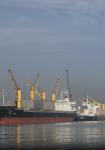China sacked its health minister and Beijing's mayor on Sunday after reporting a huge increase in SARS [Severe Acute Respiratory Syndrome] deaths and cases in the capital, a tacit admission that officials had earlier hidden the extent of the problem.
Authorities said the SARS virus had killed at least 12 more people and infected 300 [in addition to the 402 suspected cases], almost all in the capital.
Within an hour of announcing the new figures, the official Xinhua news agency carried a terse one-paragraph report saying Health Minister Zhang Wenkang and Beijing Deputy Party boss Meng Xuenong, the city mayor, had been sacked. No reason was given.
"There was no other way," said a source with close ties to government leaders. "The situation in Beijing got totally out of control and someone had to be held accountable."
The sackings were intended to put provincial leaders on notice that there should be no effort to cover up the spread of the disease, and to the world that China was serious about curbing the SARS outbreak, analysts said.
China's Vice Health Minister Gao Qiang, the top health official after his boss was sacked, blamed the surge in cases on a healthcare system ill-prepared to handle a sudden outbreak such as SARS, which emerged in Guangdong in November and has been spread around the world by air travellers since February.
He also said that the weeklong May Day holiday was being cancelled to discourage travel.
"The purpose of such an act is to avoid the flow of massive numbers of people, which potentially could lead to the spread of this epidemic," he said.
"I'm sure this measure will mean major losses for tourism revenues. However, people's lives and people's health have to be put above everything else," Gao said.
In Hong Kong, authorities said seven more people had died and 22 more were infected, taking the toll in the city to 88, the highest in the world.
Singapore closed down one of the city-state's largest vegetable markets after three workers there were infected.
The World Health Organisation said the threat of a global SARS pandemic was receding.
"The vast majority of countries reporting probable SARS cases are dealing with a small number of imported cases," the WHO said in an update on its Web site at www.who.int
"Experience has shown that when these cases are promptly detected, isolated, and managed further spread to hospital staff and family members either does not occur at all or results in a very small number of secondary infections," it said.
But the WHO said it was concerned about the outbreaks in Hong Kong and Canada. It said a large and sudden cluster of almost simultaneous cases seen in residents of a Hong Kong housing estate had raised the possibility of transmission from an environmental source.
It said the disease appeared to be more severe both in residents of the estate and in related cases among hospital staff. It could be that those patients had exceptionally high levels of virus in their bodies, it said, or the virus, which belongs to the coronavirus family, may have mutated.
In Canada, the WHO worried about an outbreak among 31 people including members of a religious group, their relatives and healthcare workers who treated them.
(Additional reporting by Jacqueline Wong and Carrie Lee)






